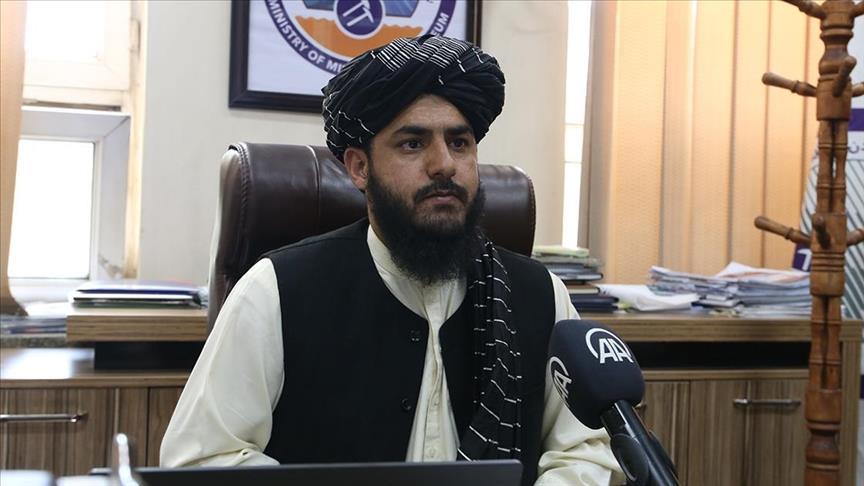Mineral-rich Afghanistan, dubbed "the Saudi Arabia of rare minerals" in a 2010 Pentagon memo, has accelerated efforts to exploit underground resources to generate higher income.
The vast quantity of mines that could not be extracted due to security threats has come back into focus since the interim Taliban administration assumed power on August 15, 2021.
Afghanistan is believed to be sitting on one of the richest troves of minerals in the world, with extensive natural gas, petroleum, coal, copper, silver, gold, cobalt, chromite, talc, barites, sulfur, lead, zinc, iron ore, salt, rare earth elements (REEs), and precious and semiprecious stone deposits.
In an article published by the news magazine The Diplomat in February 2020, Ahmad Shah Katawazai, a former diplomat at the Afghan Embassy in Washington, said minerals and REEs in Afghanistan are estimated to be worth between $1 trillion and $3 trillion.
As soon as the Taliban took control of the government, it initiated talks and signed agreements for mine exploration, the first of which was with the Chinese company CAPEIC for oil development from the Amu Darya basin in northern Afghanistan in early 2023.
- Afghanistan produces 400 tons of crude oil daily
A spokesman for the Taliban interim government's Ministry of Mines and Petroleum, Mufti Humayun Afghan, told Anadolu in an interview of his hopes that international companies will invest in Afghanistan’s vast resources.
He verified that that there are currently eight active oil wells in the Amu Darya basin, recovering approximately 400 tons of crude oil daily.
He confirmed that CAPEIC operates these oil facilities in the basin under a 25-year agreement.
Crude oil extracted from the basin is purchased by local traders to refine and resell on the domestic market, he explained.
He further stated that the government plans to open 15 new oil wells in the basin this year to bring daily crude oil production up to 1000 tons, and so far, work on drilling a new well is underway.
"We plan to operate and open oil wells in other oil basins in the future, like the Afghan-Tajik, Katavaz, Helmand and Herat basins," Afghan stated.
- International companies showing interest
In addition to the Chinese enterprise, he said that Iran, Pakistan, Türkiye, Qatar, the United Arab Emirates (UAE), and certain European investors have expressed interest in collaborating for mining operations in Afghanistan, emphasizing that "their doors are open to everyone" while assuring that any investment would be secure.
"It is our duty to ensure the security of the companies that will invest here. So, no one should worry about security. They can invest with peace of mind," he said.
Afghan confirmed that no effort has yet been made to exploit the country's significant natural gas reserves, although work has been undertaken in recent weeks to lay the pipeline that will carry natural gas from the city of Sheberghan in the north of the country to the regional hub of Mazar-i Sharif.
According to Afghan, this project, which is planned for completion in three years, will allow natural gas distribution first to factories in the city but also to homes.
Works are due to start in the Afghan-Tajik basin, which would further increase oil production by opening new oil wells.
Iron resources in the western province of Herat have piqued the interest of Iranian companies looking to expand there. Negotiations are proceeding in this regard, but no official agreement has yet been reached.
"We are also working on the operation of gold mines in the Takhar province in the northeast," he said.
- China, Germany and UAE seek opportunities to extract Afghan lithium
Afghan hopes that the country's rich lithium reserves will be developed to boost the economy.
China, Germany, and the UAE have conveyed their investment proposals for the operation of lithium mines, which the government is now studying, but no agreement for their exploitation has been achieved to date.
The country has several fields throughout various provinces that contain raw materials for cement production. Negotiations are ongoing with Turkish and Qatari companies to operate and extract such raw materials from the Jabal Saraj district.
Furthermore, a local company will take over the Kandahar field for raw material extraction.
Afghan affirmed that these fields, when operational, will employ thousands of people.
Reporting by Sayed Khodaberdi Sadat and Bilal Guler
Writing by Duygu Alhan and Sibel Morrow
Anadolu Agency
energy@aa.com.tr


